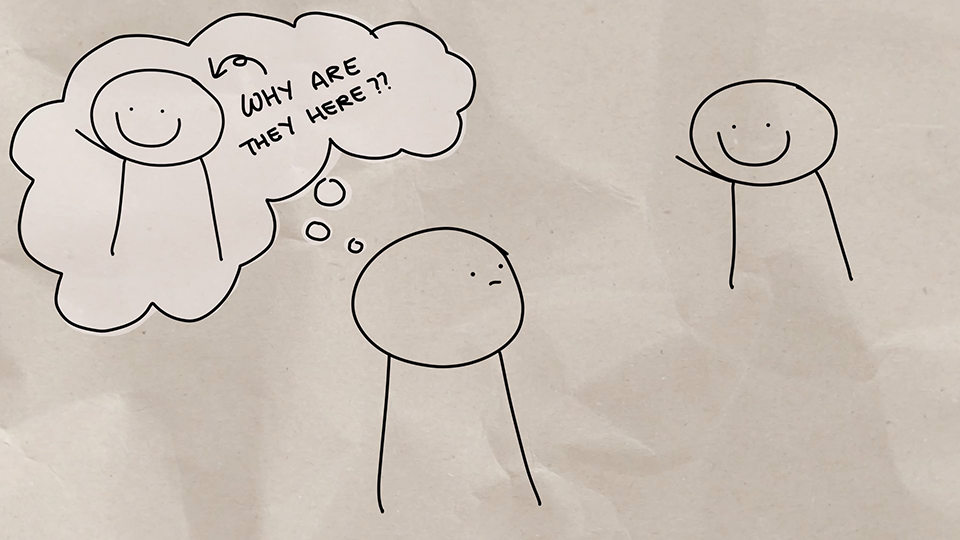Identify challenges in tech environments
For the next step to developing a sense of belonging in your team, you'll want to make sure everyone on your team feels included. You'll examine some of the challenges for tech spaces when it comes to climate, biases, and inclusivity.
How climate influences a sense of belonging
Your surrounding environment sends you messages that contribute to your sense of belonging. The climate is a way of evaluating, or taking the temperature of a space, whether that's at home, work, or school. The climate, or temperature, of tech influences who has a sense of belonging. Some find the tech environment chilly and uninviting, while others find it warm and welcoming.
What influences climate?
The people who occupy a space, and how they behave and treat each other, can affect the climate of a space. Climate is also influenced by who's absent and who is ultimately affected.

Historical challenges in tech
If you recognize that there are people similar to you in a space, you may feel invited and have a sense of belonging. It's challenging to have a sense of belonging when there aren't others similar to you in tech. Although changes are being made to make computer science more accessible and inclusive, there's still work to be done. Historically, certain groups have been excluded from tech fields. Learning about the past and present realities of others might help you think critically about how you want to build the future. When you better understand what challenges you and others might be faced with, you can proactively invite, welcome, and include people from a diverse range of backgrounds and lived experiences.
In the past, the field of tech has had many challenges when it comes to creating a culture of inclusion and belonging. For example, historically there have been:
Far fewer women than men.
Far lower percentage of people who are Black or Latinx than people who are White.
Challenges like these narrow the range of backgrounds and lived experiences in tech. This fact is a problem because diverse teams are essential.
Preconceptions about who is in tech
Historically, many people have various biases towards who "should be" in tech, which often limits who participates or excels in tech.
Explicit and implicit bias
Explicit bias is bias that you're aware of. It's conscious. Words used to describe explicit bias include racism, sexism, and classism. It manifests itself in the way individuals think of and act toward each other in all aspects of society, from hiring practices to laws.
Note
One example of explicit bias in computer science is the historic, and largely abolished, policy of discrimination against people based on gender. For example, in the 1960s, Dartmouth college had a policy that only men could use their computer science center. Sister Mary Kenneth Keller, a graduate student there and the first American woman to earn a doctorate in computer science, got special permission to use the center so she could help develop BASIC.
Implicit bias, or hidden bias, refers to subconscious attitudes or stereotypes that affect your actions, decisions, and understanding of people and events.
Preconceptions of who should be in tech
Belonging isn't always about whether you believe you can do something. It's also about whether you consider yourself as a "tech person." This component of belonging is related to mindset: the static idea of a "tech person" can indicate a fixed mindset about who is in tech. There are common preconceptions about who is in tech or who should be in tech, such as the idea that people of Asian decent and men are better at math when compared to women. Most of these preconceptions have been challenged in recent years, through equality laws, changed hiring practices, literature, and media.

Make computer science more inclusive
While changes are being made to make computer science more accessible and inclusive, there's still much work to be done. It's everyone's responsibility to promote and foster a culture of inclusivity and belongingness. Here are some things you can do to continue cultivating accessibility and inclusiveness in your own spaces:
Make note of your assumptions and how they affect your behavior.
Be brave to stick up for, or stand up to, others.
Take time to continue researching this subject.
Change the climate
To change the climate in your collaborations and community, you can:
Examine your own assumptions and biases.
Check to see whether there might be subconscious factors that influence how you view certain people.
Recognize the value of others' perspectives and ideas.
Notice who is being taken seriously and ask yourself, "Are there missing perspectives?"
Take on the perspectives of others around you and ask yourself, "Do they feel respected and valued?"
Be proactive to consider the messages and signals you're sending in your interactions.
Decide when it's time to step up to contribute and when to step back to make room for others.